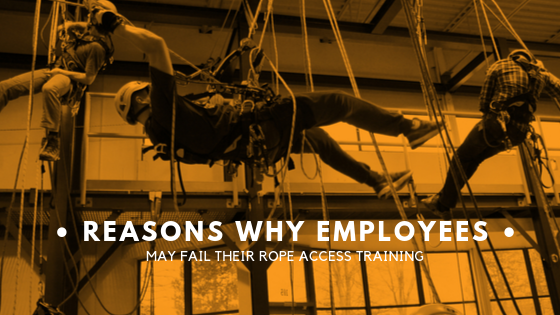
As a educational facility, we make it our mission to provide the best training environment for learning, growth, and development within the working at height industry, but specifically within the rope access curriculum. We have come to realize that providing this sanctuary of learning means walking alongside our students in their journey. From the naive beginnings of a level 1 to the ongoing development of a re-certifying level 3, we hope to be a source of information, support, and challenge.
Within this journey, it's easy to celebrate with someone in their success and heartbreaking to watch when they fail. But as life keeps reminding us, it's the pain and the challenges that help us grow and become better.
Nevertheless, it's still disappointing for you, as an employer, to invest resources into your employee for training but have them fail. Below are some reasons why your employee may fail their training. This list isn't an excuse but to hopefully provide some insight so that you can better prepare your employees to succeed in their rope access training. This list isn't comprehensive or listed in any order of importance.
1) Not enough diverse experience
Sometimes, a student isn't ready to upgrade yet because they aren't completely proficient in their current level. This is quite common depending on the type of rope access maneuvers they are doing at work. If they are doing the same ones over and over again without the opportunity to practice more unused maneuvers such as their rescues, they may be out of practice. If you recognize this in your team, encourage them to come to our open gyms. Or, contact us to organize a Rope Access Gladiator Games team event, to give them opportunity to practice skills outside of work and training.
2) Work and personal distractions
We don't want to be selfish but we do demand our students' full attention when they come into train with us. This is because the information they receive comes in a variety of ways. From practical demos, to theory lessons, to conversational discussions on the go. Any distraction may mean they could miss valuable lessons that are crucial for their assessment. We find students who have large responsibilities at work (attending to emails, calls, etc), or are going through personal issues at home tend to step away a lot and therefore miss the lessons they need to know. This is something to think about when you are deciding which employees to register for training.
3) Over-confidence
Students who have a lot of previous experience tend to come into the training week with assumptions and expectations of themselves. They also curate their own lesson plan and decide which maneuvers they want to practice more than others. Unfortunately, we've seen time and time again, that they end up failing on the maneuvers they think they've got in the bag. And, they are usually really silly mistakes. When we practice maneuvers over and over again correctly, they become ingrained in us so that it is almost automatic. However, lack of practice, can cause us to make silly mistakes or forget crucial steps when we become anxious, which is common during assessment day.
4) Bad Habits
On the flip side, practicing something incorrectly over and over again becomes automatic and therefore very difficult to change. Students can get frustrated when we try to help them break out of their bad habits. These habits might have developed to help create efficiencies in the work that they do, but may not be according to IRATA and SPRAT expectations. Again, coming to our open gyms can give them more opportunity for us to help them break out of the habits before they need to re-certify or upgrade.
5) Lack of Motivation
Sometimes, your employees just don't want to be involved with training or they see it as a nice "week off". Training week is difficult and requires patience and persistence and if your employee lacks the motivation to succeed, it is very likely they won't succeed during their Assessment. We understand that sometimes you may not have the opportunity to pick and choose and you need everyone to go through rope access training. In these situations, hopefully you can pair the less motivated with the highly motivated so that they can get some encouragement during the week!
6) Lack of Mentorship
The rope access industry is still young and growing here in North America so not every rope tech has the opportunity to work and be mentored by an experienced rope access technician. Sometimes they are faced with situations at work where they have to wing it! These are the instances where we see development of bad habits that we talked about in point 4. If you don't have any experienced rope techs working for you in your company, please encourage your employees to come to open gym night or reach out to us if they have any questions on site!
To see all our other blog posts for Rope Access Employers, head to our blog page and select the Corporate Training tag!